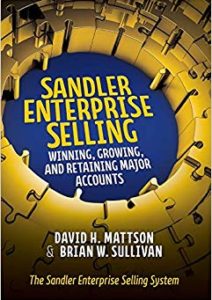So much in selling has changed over the last two years but some things remain the same, standing tall to guide us with time-worn wisdom. One involves that phrase, trite as it is, that packs great potential to gain knowledge in five short words. For all of us in the world of selling, losing happens. No matter how good you are, you will come up short on occasion. So we must always remember, “”You Win or You Learn”.
After losing a big deal, it’s often hard to know what to say. Grief tends to overwhelm logic. But at some point, someone on the losing team will say, “We should learn from this loss so we can be sure it won’t happen again”. There it is – the voice of reason. It really makes a lot of sense, doesn’t it? Why then do some of the most sophisticated selling organizations do such a lousy job of it? Why do they routinely fumble the ball and conduct post-mortem meetings that are frequently failures themselves. Perhaps it’s because neither blame or group hugs are in any way productive. Which leaves us to wonder, why is it so difficult to review the details of a loss? The answer, as is often the case, lies in human nature.
Think about this. All major metro areas have publications that annually highlight the top local physicians – the best pediatricians, neurologists, surgeons, etc. But is any recognition given to the best coroners? Of course not. But why? The answer is simple. In their autopsies, they deal with the consequences of a loss. Regardless the value of the lessons learned, there’s a people problem. No one wants to dwell on or review a loss. We look away and focus elsewhere – “Let’s go win the next one!”.
Emotions aside, there’s another practical reason why selling organizations are terrible at conducting post-mortems. There are no frameworks to follow. We all know people who plan their own funerals but, truthfully, they’re few and far between. But that prep-work, gruesome as it may seem, sets the stage for organized and yes, successful send-offs. Frameworks do the same for post-mortems and they’re built long before deals are actually won or lost. Because successful post-mortems start with effective Go/No-Go processes to help insure you pursue the deals with the highest probability of success. Your ability to target and pursue these “profile” deals is fundamental. But how do you build such a capability?
Start with an honest assessment of what your organization does well and not so well, combined with a clear picture of what a profile opportunity looks like in your world. This powerful pairing must be baked into your organizational DNA, providing your customized Go/No-Go framework. I suggest breaking down the issues surrounding a potential opportunity into three categories – Client Issues, Selling Team Issues, and Finance/Contract Issues. Then, utilizing team selling, you assemble the relevant individuals from across your organization to evaluate the issues. This forum provides the collaboration that determines your levels of stability or risk with each issue. For example, do you have relationships with the account at multiple levels? Do you understand your competition, their value propositions and the relationships they have with individual prospects? What about the contract? Are there stated guarantees, warranties or penalties and do you understand their consequences? Think about these questions and others. Why would you not evaluate them and decide to proceed without clearly understanding their implications?
If you’re stable with an issue, you check the box and move on. But where risk is identified, the question is what to do about it – what action to take. Building workable mitigation plans to quickly address risks is critical. No good can come from delays on risky issues. Your head cannot be in the sand.
The results of your mitigation efforts deliver context, knowledge and clarity, powering your Go/No-Go framework. And if the decision is made to proceed, with identified risks mitigated as effectively as possible, your due diligence has increased your chances of winning. Nothing is guaranteed, of course, because as I said, losing happens. Which takes us back to the coroner and the Go/No-Go framework that supported your decision to move forward. For after a loss, that very same framework is staring you in the face. That’s right. Your Go/No-Go framework is also the template for your post-mortem.
Remember all those business issues you reviewed to identify and mitigate risk? You missed something. Maybe you miscalculated an impact, ignored a dependency or gave yourself some undeserved benefit of the doubt. In any case, the information that drove your decision to proceed was clear. At least it was then. Reviewing it now, in the painful glare of the loss, teaches you lessons to help you avoid making the same mistakes again.
Sound Go/No-Go decision-making is a survival skill. It not only helps you determine which deals to pursue but it provides valuable insights from losses. Remember – you win or you learn!














































Comments